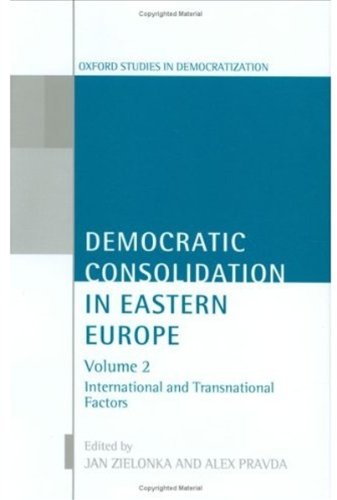

Most ebook files are in PDF format, so you can easily read them using various software such as Foxit Reader or directly on the Google Chrome browser.
Some ebook files are released by publishers in other formats such as .awz, .mobi, .epub, .fb2, etc. You may need to install specific software to read these formats on mobile/PC, such as Calibre.
Please read the tutorial at this link: https://ebookbell.com/faq
We offer FREE conversion to the popular formats you request; however, this may take some time. Therefore, right after payment, please email us, and we will try to provide the service as quickly as possible.
For some exceptional file formats or broken links (if any), please refrain from opening any disputes. Instead, email us first, and we will try to assist within a maximum of 6 hours.
EbookBell Team

4.7
16 reviews
ISBN 10: 0191529192
ISBN 13: 9780191529191
Author: Jan Zielonka; Alex Pravda
This is the second volume in a two-volume series of books on democratic consolidation in Eastern Europe. The first volume focused on the issue of institutional engineering. This second volume analyses the external parameters of democratic consolidation in thirteen Eastern European countries: how different international actors and various economic, cultural and security types of transnational pressures have shaped democratic politics in the region. The aim is to contrast a set of democracy theories with empirical evidence accumulated in Eastern Europe over the last ten years. The volume tries to avoid complex debates about definitions, methods and the uses and misuses of comparative research. Instead it seeks to establish what has really happened in the region, and which of the existing theories are helpful in explaining these developments. The volume is divided into two parts. The first part presents a conceptual and comparative frame of analysis, the second consists of detailed studies of individual countries undergoing democratic consolidation. Case study chapters deal with the following countries: Estonia and Latvia, Hungary, Poland, the Czech Republic, Slovakia, Romania, Bulgaria and Macedonia, the states of former Yugoslavia, Belarus and Ukraine, and finally Russia. The concluding chapter identifies a set of variables responsible for the enormous impact of external factors on democratic consolidation in Eastern Europe. It conceptualises the interplay of internal and external factors impinging upon democracy, and shows the interplay of different positive and negative types of external pressures. It also evaluates the conscious Western effort to craft or engineer democracy in Eastern Europe.
Part I. Comparative Perspectives
1. Western Actors and the Promotion of Democracy
2. Regionalization and Democratic Consolidation
3. The Impact of External Economic Factors: The Role of the IMF
4. International Security and Democracy Building
5. The Internationalization of Ethnic Strife
6. International Migration and the Consolidation of Democracy
7. Crime, Corruption, and Politics: Transnational Factors
8. Attitudes towards the West, Democracy, and the Market
Part II. National Perspectives
9. Estonia and Latvia: International Influences on Citizenship and Minority Integration
10. Hungary: Understanding Western Messages
11. Poland: Compatibility of External and Internal Democratic Designs
12. The Czech Republic: The Unexpected Force of Institutional Constraints
13. Slovakia: Misreading the Western Message
14. Building Democracy in Romania: Internal Shortcomings and External Neglect
15. Bulgaria and Macedonia: Voluntary Dependence on External Actors
16. Former Yugoslavia: International Efforts to Link Peace, Stability, and Democracy
17. Belarus and Ukraine: Democracy Building in a Grey Security Zone
18. Russia and the West: To Belong or not to Belong?
19. Conclusions: Foreign Made Democracy
democratic consolidation example
current conflicts in eastern europe
conflicts in eastern europe
democratic eastern european countries
democratic consolidation in uk
Tags: Jan Zielonka, Alex Pravda, Democratic, Consolidation